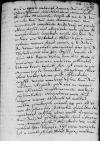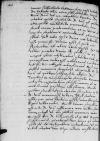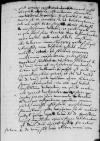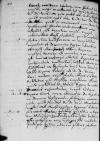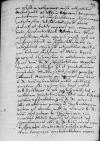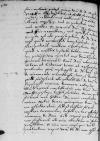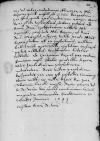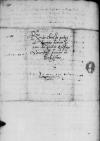Quae per ⌊Mauricium⌋ scripsit ad me Reverendissima Dominatio Vestra, ea cum ⌊reverendissimo domino⌋ meo communicavi. Non improbavit consilium Reverendissimae Dominationis Vestrae, cui paritum etiam fuisset, nisi aliquanto antequam id acceperamus, mandata missa fuissent. De eo vero non dubitat
serenissima
⌊maiestas regia⌋, quin optimo animo fiant omnia a Reverendissima Dominatione Vestra. De ⌊vicini⌋ exemplo narraverat haec ipsa ⌊dominus thesaurarius⌋, cum hic adesset. Verum id sequi ⌊maiestati regiae⌋ visum non fuit, quae se pecuniam loco non moturam pollicetur.
Litteras denuo describi feci. Est error in eis amanuensis correctus. Scripseram illas aliis verbis, ut ne quid obscuritatis inesset, verum non erat visum ⌊reverendissimo domino⌋ mutare aliquid, quod eas in manus iam aliorum consiliariorum incidisse suspicabatur.
Occupationes meae sunt magnae nimis, et simul ut incidant multae, quandoque evenit, ex quo fit, ut non ita pleraque scribantur, quemadmodum oporteret. Absum etiam paulo longius a ⌊reverendissino domino⌋, ut quae descripta sunt, relegere non semper possim.
Quietatio vix mitti poterit hoc tempore. Etsi enim recreata est a morbo suo serenissima ⌊maiestas regia⌋, nondum tamen subscribendi laborem ferre posse videtur.
De Caliga illa curae sibi futurum dixit ⌊reverendissimus dominus⌋, ut ne amplius legetur. De ⌊citatis⌋ quod scribit Reverendissima Dominatio Vestra, est quidem ita, quod multitudo peccantium non facit errori patrocinium et in duces et capita factionis animadverti plerumque solet. Sed inter ipsos duces non videntur esse primi hi. Bonum esset, si quid eis separatim ab aliis obici posset. Ego nihi[l] video praeter unum id, quod se in eo magis aliis obstinatos ostenderunt, quo[d] processione interesse noluerunt, cui tamen reliqui duo collegae interfuerunt. Nisi me fallit memoria, scripserat aliquando Reverendissima Dominatio Vestra, et quidem superstite adhuc domino ⌊Tomitio⌋ in iurisiurandi formula Romanae ecclesiae expunctum fuisse nomen et in eius locum positum Christianae. Quod quidem semel atque iterum scriptum a Reverendissima Dominatione Vestra meminisse videor. Id si factum esset, per quos factum esset, animadversion[e] digni viderentur. Quod tamen scriptum esse a Reverendissima Dominatione Vestra affirmare non audeo. Fieri enim potest, ut me fallat memoria mea.
Scripsit huc ⌊dominus Culmensis⌋ et serenissimae ⌊maiestati regiae⌋ supplicavit, quandoquidem turpe est iudiciu[m], quod sit ad instigatoris instantiam, ut ne velit ⌊citatos⌋ tam turpi iudicio conflictari, quod eorum existimatione detrimenti posset aliquid adferre, sed iudicium clementer commutare dignetur. Respondit serenissima ⌊maiestas regia⌋ se in ⌊comitiis⌋ de eo deliberaturam. Ad me nihil de eo scripsit. Secus fortasse de me suspicari videtur, eo quod aperte cum eo, quae sensi, sum locutus, nam dissimulanter agere nescio. Sed certe fidele consilium illi dederam anno superiori, quod si sequi voluisset, iam defuncti essent omni molestia citati et felicius opinione multorum causa eorum processisset.
Expediret, sententiam ut suam scriberet Reverendissima Dominatio Vestra, num ab instigatoris instantia liberi esse debeant. Si nihil est, quod eis separatim obici queat, et ita, ut vult Reverendissima Dominatio Vestra, quod quidem etiam futurum spero, clementer cum eis agi debet. Consultum videretur, ne quid contra eos ageret instigator, [ne re]s serio agi coepta parum serio terminata videretur. Si vero per instigatorem agendum omnino putat, necesse esset scribi accusationis formulam, quae nusquam scribi melius potest quam apud Vestram Reverendissimam Dominationem, secundum cuius consilium omnia facere deliberatum est.
⌊Reverendissimus dominus⌋ cuperet ipse de his rebus scribere Reverendissimae Dominationi Vestrae, sed cum aliena manu non liceat, otii vero tantum non habeat, ut s[ua] possit, mihi mandavit, ut ipse scriberem Reverendissimae Dominationi Vestrae, a qua petit, ne moleste fera[t], quod paucis agit cum Reverendissima Dominatione Vestra.
De ⌊vicin[o]⌋ scribitur, quod is convenerit cum ⌊duce Leg[nicensi]⌋ ⌊Posnaniae⌋. Frater ⌊eius⌋ ⌊Georgius⌋ non affuit, sed legatum misit. Causa conventus fuisse scribitur, quod metuunt sectae suae Lutheranae, cui consultum cupiunt et ⌊Danorum regem⌋ adiutum. Scripsit iteru[m] ad ⌊maiestatem regiam⌋ copiose, verum ad ⌊comitia⌋ res reiecta est. Novas rationes attulit, legatos cum auctoritate mittendos suadet. Quae priu[s] scripserat, ea descripta misi una cum
serenissimae
⌊maiestatis regiae⌋ litteris ad Reverendissimam Dominationem Vestram, dari autem iussi fratri illius ⌊Gedani⌋. Redditas esse confido. Consilium illius, quod postulat
serenissima
⌊maiestas regia⌋ de rebus Danicis, exspectatur. Erant litteris regiis binae meae adiunctae. De legato in re Danica designato futurum omnino puto, quod suadet Reverendissima Dominatio Vestra. Mandatum mitto.
Ab ⌊archiepiscopo Rigensi⌋ litterae fuerunt a[ll]atae, quibus queritur, a ⌊regi[a] Romanorum maiestate⌋ superintendentem sibi datum esse, quasi per eum religio sit mutata. Quod per ipsum ordinem potius factum, qui ipse sit in religionis causa culpabilis. Quare petit
serenissimam
⌊maiestatem regiam⌋ tamquam protectorem et conservatorem superiorem ecclesiae suae, ut sollicitet apud serenissimos fratres et status imperii, quo commissio data superintendenti abrogetur, donec inquisitione facta cognosci possit, ipsene archiepiscopus an superintendens in religionis causa sit culpabilis. Quod se per litteras facturam
serenissima
⌊maiestas regia⌋ praecepit.
Responsum in ⌊citatorum⌋ causa spero Vestrae Reverendissimae Dominationi satisfacturum. Magister ⌊Iacobus⌋ absolutus est et ⌊Piiotrckoviam⌋ profectus. Multa petiit, nihil prorsus obtinuit. Nuntium, qui venerat cum litteris Reverendissimae Dominationis Vestrae, inscientibus nobis absolvit. Scriptum sibi responsum dari petiit, sed discedens a me postulavit, ut ⌊ei⌋ mitterem ⌊Piiotrkoviam⌋ una cum litteris, quibus respondetur Vestrae Reverendissimae Dominationi, quas se illi curaturum promisit.
Instructionem visum est iterum mitti in manus Reverendissimae Dominationis Vestrae inscriptam ⌊domino thesaurario⌋. ⌊Cui⌋ mandat ⌊maiestas regia⌋, ut, simul ut significaverit illi Reverendissima Dominatio Vestra, curet eam designatis oratoribus perferendam, nam temporis opportunitatem nemo scire melius potest quam Vestra Reverendissima Dominatio. Quod si vero hoc illi displicet et secus faciendum putat, reddat nos certiores; parebitur illius consilio. Erit in potestate eius aut mittere in manus ⌊domini thesaurarii⌋, aut huc remittere, aut apud se retiner[e]. Scripta est ad praescriptum Reverendissimae Dominationis Vestrae, nisi quod nonnihil amplificata. Si fieri poterit, mittam exemplum, nisi quod a multis describi tutum non est, ne prius, quam oportet, res divulgetur.
Formam iuramenti ⌊reverendissimo domino⌋ interpretatus, itidem et litteras ⌊vicini⌋, et responsum. Probantur, quae rescripsit Reverendissima Dominatio Vestra, sed de iuramento meminisse idem se dicebat, quod scripserit aliquando Reverendissima Dominatio Vestra de suppresso nomine Romanae ecclesiae. Quid egerit ⌊Constellatus⌋ cum reverendissimo ⌊domino archiepiscopo⌋, nihil scribitur, quare quod scribam, non habeo.
De novo confratre miror. Nolui dicere quicquam ⌊reverendissimo domino⌋, ne offenderetur, sed si iussus fuerit explere triennium, nihil ea res offendet animum reverendissimi domini. Sed corpus praebendae non suffecerit ad eum alendum, in ⌊Italia⌋ praesertim. Si iure meo consequi vult praebendam ⌊nepos⌋ Vestrae Reverendissimae Dominationis, non esset ab[s] re, ut interpretationem obtineret a ⌊maiestate regia⌋, quod nihil sit ei iuri derogatum per hoc, quod ego cantoriam accepi. Qua de re, si ita visum fuerit, scribere poterit ad ⌊reverendissimum dominum⌋.
Epithalamion reddidi ⌊maiestati reginali⌋, praesente ⌊maiestate regia⌋ et ⌊reverendissimo domino⌋. Accepit ridens, vultu grato. ⌊Maiestas regia⌋ statim ab ea postulavit. Multum laboravit aperiendo, epistulam inspexit, postea reddidit.
Anthonino litteras reddidi; ad ⌊Georgium Hegel⌋ per certum hominem misi. Statui quatriduo ⌊regiae maiestatis⌋ ⌊Piiotrckoviam⌋ profectionem antevertere. Dies autem profectioni designatus per eam est postridie Circumcisionis. Nova mitto ex aula ⌊regis Romanorum⌋ per Adamum Caroli missa.
Deum precor, ut Reverendissimam Dominationem Vestram diu servet incolumem. Cuuis me gratiae commendo.
